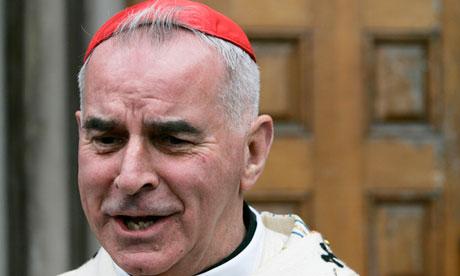Cardinal Keith O'Brien: Scourge of Liberals with a Flair for Rhetoric
By Sam Jones
Even Keith O'Brien's friends and admirers would probably admit that he has a regrettable tendency to deploy the heavy artillery of rhetoric whenever the public debate touches on matters of homosexuality, abortion or secularism. As befits one of the most outspoken churchmen of the already outspoken Roman Catholic church in Scotland, he has never been slow to condemn what he sees as immorality whenever and wherever he sees it. His vigorous opposition to same-sex marriage – "a grotesque subversion of a universally accepted human right" – his comparison of the abortion rate to "two Dunblane massacres a day" and his description of the implications of the human fertilisation and embryology bill as "grotesque" and akin to "Nazi-style experiments" earned him the respect and gratitude of conservative Catholics pleased to see a cardinal taking a stand. His language and intractability also infuriated liberals, progressive Catholics and equality campaigners. Last year, the lesbian, gay and bisexual charity Stonewall decided to reward his "vitriolic campaign against equality in Scotland" with its bigot of the year award. "If Roman Catholics don't approve of same-sex marriage," said its chief executive, "they should make sure they don't get married to someone of the same sex". When news of his resignation emerged on Monday, his opponents were swift to dismiss him as a "long-term opponent of gay equality" and an archbishop who had ensured that his church campaigned against "every major step towards LGBT [lesbian, gay, bisexual and transgender] equality in the UK". However, oddly for a man who came to be regarded as a figure of hate to some, his views were not always so set or extreme: O'Brien, who was appointed archbishop of St Andrews and Edinburgh in 1985, was initially thought to be quite liberal, defending the rights of gay teachers to work in Catholic schools. As the years went by, his pronouncements became louder and less forgiving – even if his amiable demeanour did not. The Catholic writer Austen Ivereigh describes him as a "very affable, warm and hospitable" man who simultaneously managed to be a "very stalwart defender" of the Scottish church's stances on controversial issues. "He has been valued for his forthrightness and directness – even though I think sometimes some of his pronouncements have not been judiciously phrased," he says. In 2003, after being awarded the Equestrian Order of the Holy Sepulchre of Jerusalem: Knight Commander with star, and serving as Apostolic Administrator of the Diocese of Argyll and the Isles, he was promoted by John Paul II, becoming only the third Scottish cardinal since the Reformation. Despite his rise to the top of the Roman Catholic church, he was not seen as a power player or a man with obvious designs on the throne of St Peter. "He's never been considered one of the high-flying cardinals," says Ivereigh. "He doesn't know Rome that well or have fluent Italian and so he's never been a cardinal who has been as significant in the Vatican as Cardinal Murphy-O'Connor." In any case, as a 74-year-old priest with heart problems and a pacemaker – a man "at times in indifferent health" as he put it yesterday – he is unlikely to have had the strength to seek further advancement. The penultimate twist in his long and unpredictable ecclesiastical career came last Friday, two days before it emerged that he had been accused of "inappropriate acts" by fellow priests. In an interview that surprised many, the traditionalist and scourge of liberals suggested that the next pope would do well to review the prohibition on priests marrying as the demand for celibacy was not of "divine origin". The cardinal, who said that he himself had never considered marriage, added that he did not see why it should not be a possibility for others. "It is a free world," he said. "And I realise that many priests have found it very difficult to cope with celibacy as they lived out their priesthood and felt the need of a companion, of a woman, to whom they could get married and raise a family of their own." For John Haldane, professor of philosophy at the University of St Andrews and a Vatican adviser, O'Brien's resignation was a "shocking and sad" event. In a tribute issuedon Monday, Haldane was already referring to O'Brien in the past tense. "He was a well-known and well-liked figure within the Catholic church in Scotland, in Britain and more widely; and within Scotland he had good relations with other churches and faiths, and with civil and political society," he said. What happens to O'Brien, to his archbishop's legacy and to his parting counsel remains to be seen. It will be for the Vatican to decide on what action, if any, is to be taken over the allegations. Only two things appear certain now. The first is that the career of one of Britain's most senior clerics is all but over. The second is that almost eight years after voting in the conclave that chose Benedict XVI, Cardinal Keith O'Brien seems too irredeemably tainted by scandal and allegations of hypocrisy to find himself electing any future popes.
|
.
Any original material on these pages is copyright © BishopAccountability.org 2004. Reproduce freely with attribution.
